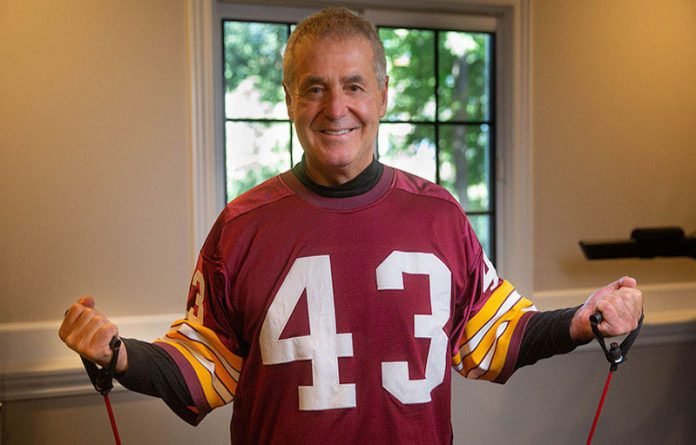
Kris Nicholoff wasn’t deterred when he learned his first catheter ablation to treat persistent atrial fibrillation would need to be followed up by a second ablation for another heart rhythm condition known as atrial flutter.
He knew going in that a second ablation could be in the cards.
The now 59-year-old didn’t think twice about it.
In fact, he has advice for others with the same condition: “If you have an issue related to atrial fibrillation, why not get it taken care of? It’s such a simple procedure.”
Atrial fibrillation, or Afib, is a condition in which the heart beats irregularly. It originates in the upper chambers of the heart and affects blood flow to the heart muscle as well as to the rest of the body.
Persistent atrial fibrillation symptoms last for longer periods of time —often for weeks to months if not years with the heart unable to regulate itself.
An estimated 6 million Americans have some form of Afib, which can lead to stroke and other heart-related complications.
Treatment for atrial fibrillation focuses on improving symptoms and quality of life and, most important, preventing complications, says electrophysiologist Hakan Oral, M.D., of the University of Michigan Health Frankel Cardiovascular Center.
Timing of treatment is important, too, says Oral.
“There is a large body of evidence that shows the earlier the intervention the more successful the outcome of catheter ablation for treating Afib.”
The heart rhythm condition can have a range of causes, including genetics, heart disease, hypertension and obesity.
Research also reveals that obstructive sleep apnea, something Nicholoff had been diagnosed with years earlier, can be a facilitator for atrial fibrillation.
The right treatment
For many patients, catheter ablation can be the recommended treatment, says Oral, who performed the procedures on Nicholoff.
Catheter ablation doesn’t involve major surgery. Instead, catheters (thin, flexible wires) are routed through a blood vessel in the groin into the heart.
A special machine sends energy to the heart through one of the catheters to heat or freeze the “short circuits” in the heart that are involved in the abnormal heart rhythm.
The U-M Health team has had much success with catheter ablation treatment, resulting in an improved quality of life for patients like Nicholoff.
“Kris was a healthy, robust person and a perfect candidate for ablation,” said Oral, who noted that the persistent Afib that was slowing him down is more challenging to treat.
“In these cases, while we are successful in eliminating the atrial fibrillation, a condition known as atrial flutter may show up and require a second stage ablation.”
In and out of Afib
Nicholoff, CEO and Director of the Michigan Osteopathic Association, says his Afib began three years ago and was diagnosed by his primary care physician in his hometown of Okemos, Michigan.
“At first, my heart palpitations were on and off, but then they became more frequent,” said Nicholoff.
He underwent two cardioversions — a medical procedure to correct a heartbeat that is too fast or irregular — at a local hospital.
The cardioversion procedures worked but the effects didn’t last long, Nicholoff recalls, noting that he was still going in and out of Afib.
“It was significantly impacting my quality of life,” he said. “I was getting tired while exercising or walking up the stairs. I even felt my Afib while lying down watching TV.
It got to the point where it was happening 75% of the time, then 100% of the time. I was in a constant state of Afib. That’s when I talked with a friend who recommended I contact U-M.”
Nicholoff met with Oral, who explained that it may take more than one ablation to get his persistent atrial fibrillation corrected. And it did.
Finally, getting through the day
Nicholoff underwent ablations in January 2020 and March 2021 — 14 months apart.
“I was so impressed with my experience at U-M. From the check-in procedures to Dr. Oral and his team — everyone was awesome. Every step of the way I felt comfortable. It was all top notch.
“After going through the first ablation, I was very confident about the second one because I knew what to expect. Since then, I’ve had no episodes of Afib.”
Nicholoff is also sleeping better, has more energy and is happier.
“I have more interest in doing things. With Afib I had no energy and I found it hard to get through the day.”
The ablations have helped him in other ways, as well.
“When my health was compromised, I had a loss of confidence and hope – I was getting discouraged. By having my Afib addressed, I have more confidence, enthusiasm for life and hope.”
Nicholoff says it has also led him to work on other parts of his life, including mental health, cardiovascular health and preventative measures.
With his ongoing enthusiasm and hope, he has a message for others experiencing atrial fibrillation:
“If you’re in this situation, why wait? I wish I had addressed my Afib years earlier. Why wouldn’t you go somewhere where doctors can help you?”
Written by Jane Racey Gleeson.
If you care about heart disease, please read studies about drug combo that prevents stroke and heart disease, and magnet in these popular devices may harm your heart health.
For more information about heart health, please see recent studies about a new cause of heart attack, and results showing this stuff in beef, chicken, dairy may increase risk of heart disease, death.



